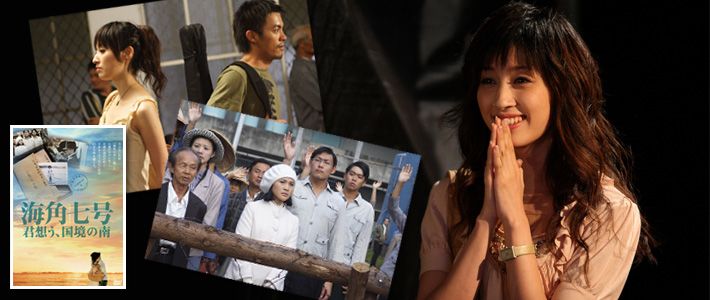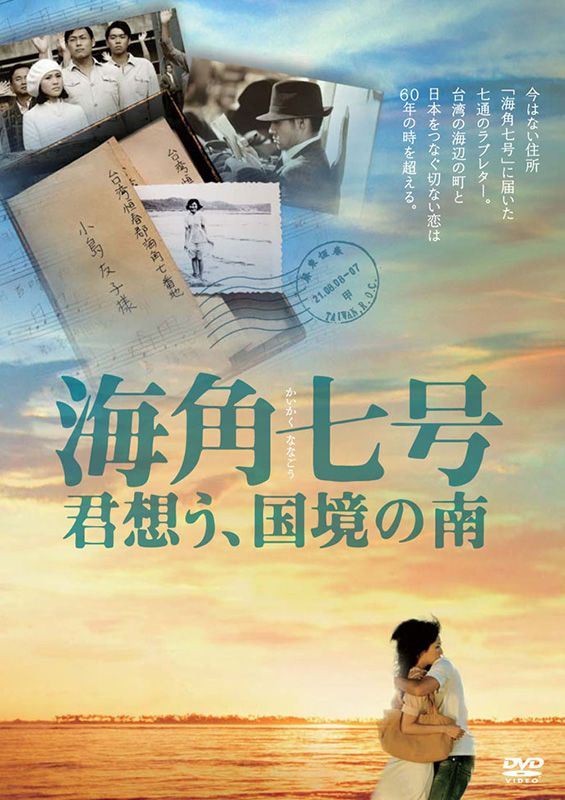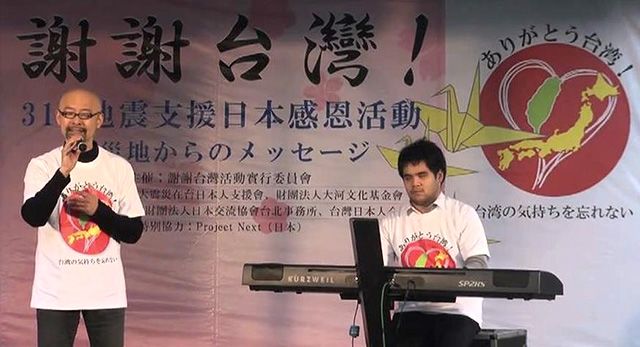
Japan and Taiwan: Diplomacy Without Diplomats
Japanese Artists in Taiwan: A Reciprocal Love Affair
Politics Society Culture- English
- 日本語
- 简体字
- 繁體字
- Français
- Español
- العربية
- Русский
Japanese actress hits the big time in Taiwan
Produced by Wei Te-sheng, Cape No. 7 became the biggest hit in the history of Taiwanese cinema when it was released in 2008. The film was also a breakthrough for a certain Japanese actress. Tanaka Chie had already done acting work in Japan before she traveled to Taiwan to learn Chinese. She soon picked up the language and started writing a blog in Chinese. When this came to the attention of Wei Te-sheng, casting around for a Japanese actress for his latest film, a star was born.
I was in Taiwan myself at the time, working in Taipei with the Interchange Association of Japan, an organization that works to develop good relations and exchanges between Japan and Taiwan in the absence of formal diplomatic ties. I was in charge of the cultural affairs division. Tanaka was one of the people we invited to our “Japan Night,” held during the Taipei Film Festival to promote Japanese film and bring together film people from Japan and Taiwan. Soon after, Cape No. 7 scooped the Grand Prix for best film and went on to be a huge hit. Tanaka was suddenly the star of the hour.
Four years later, I made a cameo appearance in Touch of the Light (directed by Chang Jung-chi) as the composer of the film’s title song. This time it was my turn to enjoy the limelight. At the opening ceremony of the Taipei Golden Horse Film Festival, I was thrilled to have the opportunity to mingle with the directors and actors on the red carpet. In 2012 the film was a huge hit in Taiwan and was submitted as Taiwan’s entry for an Academy Award for best foreign language film. The film has since been shown at festivals in Tokyo, Busan, and Berlin. For several years now I have been based in Taiwan, where I have been able to observe the society from the twin perspectives of cultural exchange worker and musician. In this article I want to look at why so many Japanese artists and musicians like me have chosen to base themselves in Taiwan. What is the historical and cultural background to this trend, and what accounts for their success?
 Cape No. 7 was the 2008 breakthrough hit that made Tanaka Chie a star in Taiwan. The film tells the story of a young musician. When his dreams of making it big in Taipei come to nothing, he returns to his hometown of Nengchen on the southernmost tip of the island. He is working there as a postal delivery worker when he meets and falls in love with a struggling Japanese model. Interweaved with the contemporary drama is the story of a parcel of love letters that a Japanese man wrote to a Taiwanese woman some 60 years ago but never sent. After the man’s death, his daughter discovers the letters and sends them to Taiwan, but the old Japanese-era address means they cannot be delivered. The young man works to track down their rightful owner. The film grossed NT$530 million in Taiwan, becoming the biggest box office hit in the island’s history.
Cape No. 7 was the 2008 breakthrough hit that made Tanaka Chie a star in Taiwan. The film tells the story of a young musician. When his dreams of making it big in Taipei come to nothing, he returns to his hometown of Nengchen on the southernmost tip of the island. He is working there as a postal delivery worker when he meets and falls in love with a struggling Japanese model. Interweaved with the contemporary drama is the story of a parcel of love letters that a Japanese man wrote to a Taiwanese woman some 60 years ago but never sent. After the man’s death, his daughter discovers the letters and sends them to Taiwan, but the old Japanese-era address means they cannot be delivered. The young man works to track down their rightful owner. The film grossed NT$530 million in Taiwan, becoming the biggest box office hit in the island’s history.
Written, directed, and produced by Wei Te-sheng
Starring: Van Fan (Fan You-chen), Tanaka Chie, and Atari Kōsuke
DVD distributed in Japan by Maxam Inc.
(C) 2008 ARS Film Production. All Rights Reserved.
Chinese-Speaking Japanese Artists Wooing Taiwan
The Japanese actors and musicians working in Taiwan all have several simple things in common. First, they all speak excellent Chinese. Second, they all have a deep and sincere love for Taiwan. And third, this affection is reciprocated by the people of Taiwan.
Being able to use Chinese is essential for anyone who wants to live and work in Taiwan, given that it is effectively the “national language.” By coming to study in Taiwan, Tanaka was following the most common pattern among Japanese artists who have settled in Taiwan. Others have a spouse or parent from Taiwan. In my own case, I am now fairly comfortable in Chinese, having studied Chinese literature at university, which included a stint in Shanghai. The time I spent working in Beijing also helped.
In many cases, the artists’ attachment to Taiwan comes from the affection for the island that led them to base themselves here.
I originally came to Taiwan for work. The decision was taken for me by my employers. In my spare time I continued to compose new music, inspired by the beautiful natural scenery of Taiwan and the warmth of its people. After a while I made friends with some local musicians, and we formed a group called the Baba Band and started to play gigs, mostly at the Riverside Live House in Taipei. Even when I was moved back to Japan after three and a half years, I would still return to Taiwan once every couple of months to play with the band.
Later, when my friend the director Chang Jung-chi asked me to supply the theme song for his film Touch of the Light and to make a cameo appearance in the film itself, I decided to quit my job as an office worker and return to Taiwan to dedicate myself to my music. Why? What can I say, except that this is where my friends are? Of course, everyone has their own reasons for moving. But all the Japanese artists I know feel some kind of special affection and attachment to the place. They have taken a deliberate decision to develop a personal relationship with the place and its people.
Taiwan’s Fascination with Japan Transcends Generations
The third factor arises from the openness of the Taiwanese public to the Japanese artists and the readiness of people on the island to accept and appreciate Japanese culture. This of course is intimately linked to the island’s historical and cultural background. Indeed, it may be the most important factor of all in any discussion of cultural relations between Japan and Taiwan. It deserves to be treated at some length.
People in Japan often think of Taiwan as a place that is typically “friendly” to Japan and its culture. In a survey carried out by the Interchange Association of Japan on Taiwanese people’s feelings about Japan in January 2013, 43% of respondents chose Japan as their “favorite country,” and 65% said they “felt close” to the country. These figures show the great affection that exists in Taiwan for Japan. Taiwan seems to be predisposed to accepting Japanese culture. But why? To answer this question, it may be helpful to have a look at the generational makeup of the population.
For the sake of convenience, I divide the population of modern Taiwan into three generations. The “educated in Japanese” generation grew up during the period of Japanese rule and was educated in the colonial language. The “martial law” generation grew up when the use of Japanese was outlawed. More recently, the “Japan fan” generation consumes and participates in Japanese culture in real time, more or less as soon as it is released in Japan.
The generation of Japanese-educated Taiwanese, now mostly in their eighties, can speak Japanese more or less as fluently as they can their native Hokkien Chinese. Even today, groups of people continue to participate in traditional Japanese cultural pursuits, such as reading and writing tanka and haiku verse. Even taking into account the negative colonial aspects of Japanese rule, the majority view is generally appreciative of the contribution Japan made to Taiwan’s modernization. It is this generation, educated in Japanese, that is to thank for this view and for the sympathetic attitude toward Japan that exists within many families.
The next generation, of people now in their forties to seventies, grew up during the roughly 40-year period of martial law, when the use of Japanese was forbidden in schools, offices, and the public media. During this time, the use of Mandarin was obligatory, so that people who had been in Taiwan since before the war and had grown up speaking Hokkien Chinese were forbidden from using their mother tongue in public settings. Despite this difficult legal situation, however, it would be a mistake to assume that this generation of people grew up without any contact with Japanese language or culture at all.
For one thing, in many families the parents who had grown up during the Japanese period continued to use Japanese at home, so many people naturally picked up the language from their parents and grandparents. Another factor was the Qunxinghui “Gathering of Stars” music program that was one of the mainstays of Taiwanese television during the 1960s and 1970s. Naturally, the program was broadcast in the official “national language” of Mandarin Chinese, but many of the pieces performed were Japanese popular songs set to Chinese lyrics. Particularly influential was Teresa Teng, who dominated the Chinese-language popular song market for two decades and also became popular in Japan. The fact is that even during this period when Japanese was officially outlawed, people in Taiwan were still absorbing the influence of Japanese mass popular culture.
And then there is the “hari”(*1) generation of “Japan fans.” With the lifting of martial law in 1987, Taiwan made quick progress toward democratization. The restrictions on Japanese language and culture started to ease—particularly after Chiang Ching-kuo died in 1988 and was succeeded as president by Taiwan-born Lee Teng-hui, who had grown up during the Japanese period. This coincided with the global boom in Japanese studies during the 1990s, and Japanese subculture began to flood into Taiwan. A new generation of Japan fans, or the “hari tribe” as they are called, came into being.
An interest in and understanding of Japanese culture has therefore always been part of Taiwan’s cultural makeup, even if its exact shape and form have changed over the generations. The historical fact of Japanese rule for half a century meant that Japanese culture was incorporated as a natural part of Taiwanese culture. Over the years since the war, these cultural elements have grown into the fertile setting for the pro-Japanese sentiment that we see today.
The Appeal of Taiwan for Japanese Artists
Lastly, I want to say a few words about the diversity and flexibility of Taiwanese culture, as well as Taiwan’s potential as a market. In Taiwan’s Taoist temples, alongside worship of Mazu, the sea goddess venerated across southern China, it is not uncommon for people to worship the Guanyin bodhisattva (Avolokitesvara) and Confucius together. This kind of syncretism is typical of Taiwan, where diverse elements of different cultural traditions rub shoulders and people are accepting of anything that promises to bring them profit.
Alongside this diversity, another striking characteristic of Taiwan is how adaptable and flexible its people are. If a new business fails to make money within six months or so, it is not uncommon for the owner to close it down and start something new. Even if this second business succeeds, the owner will always remain on the lookout for the best moment to sell up and move on to the next opportunity. This flexibility and dynamism are in many ways the polar opposite of Japan, with its unbending attention to detail. For artists this diversity and flexibility provides a comfortable and free environment in which to work.
Another factor is the easy accessibility to the Taiwanese market. With its compact population of 23 million and its low threshold to entry, the market performs the role of pilot for other markets in China, Hong Kong, and Singapore. There is always the promise that any success here can be leveraged into success on a broader scale in those larger markets. It is important to remember that in music and video, a pan-Asian market already exists across language and national borders. Until relatively recently, it was common for songs that had been hits in Japan to be translated into Chinese in Taiwan and then to spread gradually from there into other Chinese-speaking markets. Today, information is transmitted almost instantly around the world via the Internet. This makes it less imperative than before for artists to be necessarily based in Japan.
Taiwan is also insulated against infection from what Japanese businesses sometimes call the “China risk.” This is another thing that makes the island an attractive base for artists. Although China is highly attractive as a market, there is a constant danger of political risk. When relations between China and Japan deteriorated owing to the spat over the Senkaku Islands last year, for example, a Japanese television personality found himself more or less excluded from Chinese TV because of his nationality. Japanese musicians based in Taiwan were excluded from a scheduled tour of China at the instigation of the Chinese organizers. It is more or less impossible to imagine a situation arising between Japan and Taiwan that would prevent a Japanese artist from taking the stage in this way. This sense of security is something precious for an artist. I would not change it for anything.
 The author performs at a “Thank You Taiwan” concert to show Japanese gratitude for Taiwanese earthquake relief support, along with the blind pianist Huang Yu-hsiang, who played the lead role in the film “Touch of the Light.”
The author performs at a “Thank You Taiwan” concert to show Japanese gratitude for Taiwanese earthquake relief support, along with the blind pianist Huang Yu-hsiang, who played the lead role in the film “Touch of the Light.”
The donations that came into Japan after the tsunami disaster in Tōhoku in 2011 made many people in Japan aware for the first time of the affection that exits for Japan in Taiwan. It also did much to raise awareness of the island in Japan. This led to various efforts to convey a sense of Japanese gratitude to Taiwan.
These signs of appreciation have been welcomed by the Taiwanese. For a long time, there was a feeling that the affection many people in Taiwan felt for Japan was not fully reciprocated. It was something of a one-sided love affair. But recently the Japanese have started to court Taiwanese affections and return these feelings of affection in kind. Artists and musicians like me, based in Taiwan, have the privilege of standing in for the whole of Taiwan and conveying to the whole island a sense of Japanese affection.
(Originally written in Japanese. Title photo: Scenes from Cape No. 7, courtesy of Maxam Inc.)
(*1) ^ The word hari is written using the pinyin system for transcribing the Chinese language. The pronunciation is naturally very different from what might be expected by readers familiar with the system Nippon.com uses to transcribe Japanese words.—Ed.
movie earthquake tsunami China music Taiwan Baba Masaki Tanaka Chie hari colonialism